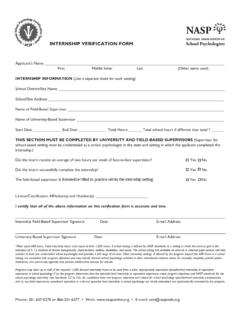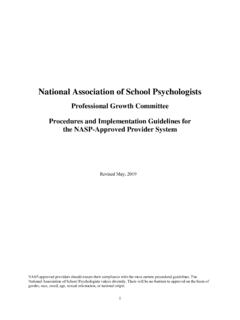Transcription of National Association of School Psychologists Principles ...
1 National Association of School PsychologistsPrinciples for Professional Ethics2010 TABLE OF OF RESPECTING THE DIGNITY AND RIGHTS OF ALL Psychologists engage only in professional practices that maintain the dignity of all individuals. In theirwords and actions, School Psychologists demonstrate respect for the autonomy of persons and their right to self-determination, respect for privacy, and a commitment to just and fair treatment of all Autonomy and Self-Determination (Consent and Assent)..3 Principle Privacy and Fairness and PROFESSIONAL COMPETENCE AND , or responsible caring, means that the School psychologist acts to benefit others.
2 To do this, schoolpsychologists must practice within the boundaries of their competence, use scientific knowledge from psychologyand education to help clients and others make informed choices, and accept responsibility for their Accepting Responsibility for Responsible Assessment and Intervention Responsible School -Based Record Responsible Use of HONESTY AND INTEGRITY IN PROFESSIONAL foster and maintain trust, School Psychologists must be faithful to the truth and adhere to their professionalpromises. They are forthright about their qualifications, competencies, and roles; work in full cooperation withother professional disciplines to meet the needs of students and families; and avoid multiple relationships thatdiminish their professional Accurate Presentation of Professional Forthright Explanation of Professional Services, Roles, and Respecting Other Multiple Relationships and Conflicts of RESPONSIBILITY TO SCHOOLS, FAMILIES, COMMUNITIES, THE PROFESSION, AND Psychologists promote healthy School , family, and community environments.
3 They maintain the publictrust in School Psychologists by respecting law and encouraging ethical conduct. School Psychologists advanceiprofessional excellence by mentoring less experienced practitioners and contributing to the School psychologyknowledge Promoting Healthy School , Family, and Community Respect for Law and the Relationship of Law and Maintaining Public Trust by Self-Monitoring and Peer Contributing to the Profession by Mentoring, Teaching, and Contributing to the School Psychology Knowledge Association of School PsychologistsiiNational Association of School PsychologistsPrinciples for Professional Ethics2010 INTRODUCTIONThe mission of the National Association of SchoolPsychologists (NASP) is to represent School psychologyand support School Psychologists to enhance thelearning and mental health of all children and s mission is accomplished through identificationof appropriate evidence-based education and mentalhealth services for all children.
4 Implementation ofprofessional practices that are empirically supported,data driven, and culturally competent; promotion ofprofessional competence of School Psychologists ; recog- nition of the essential components of high-qualitygraduate education and professional development inschool psychology; preparation of School psychologiststo deliver a continuum of services for children, youth,families, and schools; and advocacy for the value ofschool psychological services, among other psychologistsprovide effective services to helpchildren and youth succeed academically, socially,behaviorally, and emotionally.
5 School psychologistsprovide direct educational and mental health servicesfor children and youth, as well as work with parents,educators, and other professionals to create supportivelearning and social environments for all children. Schoolpsychologists apply their knowledge of both psychologyand education during consultation and collaborationwith others. They conduct effective decision makingusing a foundation of assessment and data Psychologists engage in specific services forstudents, such as direct and indirect interventions thatfocus on academic skills, learning, socialization, andmental health. School Psychologists provide services toschools and families that enhance the competence andwell-being of children, including promotion of effectiveand safe learning environments, prevention of academicand behavior problems, response to crises, andimprovement of family School collaboration.
6 The keyfoundations for all services by School Psychologists areunderstanding of diversity in development and learning;research and program evaluation; and legal, ethical, andprofessional practice. All of these components and theirrelationships are depicted in Appendix A, a graphicrepresentation of a National model for comprehensiveand integrated services by School Psychologists . Schoolpsychologists are credentialed by state educationagencies or other similar state entities that have thestatutory authority to regulate and establish credential-ing requirements for professional practice within a Psychologists typically work in public or privateschools or other educational NASPP rinciples for Professional Ethicsis designed tobe used in conjunction with the NASPS tandards forGraduate Preparation of School Psychologists ,Standards for theCredentialingofSchoolPsychologists.
7 AndModelforComprehensive and Integrated School Psychological Servicestoprovide a unified set of National Principles that guidegraduate education, credentialing, professional prac-tices, and ethical behavior of effective School psychol-ogists. These NASP policy documents are intended todefine contemporary School psychology; promote schoolpsychologists services for children, families, and schools;and provide a foundation for the future of schoolpsychology. These NASP policy documents are used tocommunicate NASP s positions and advocate forqualifications and practices of School Psychologists withstakeholders, policy makers, and other professionalgroups at the National , state, and local formal Principles that elucidate the properconduct of a professional School psychologist are knownasethics.
8 In 1974, NASP adopted its first code of ethics,thePrinciples for Professional Ethics( Principles ), and revisionswere made in 1984, 1992, 1997, and 2000. The purposeof thePrinciplesis to protect the public and those whoreceive School psychological services by sensitizing1school Psychologists to the ethical aspects of their work,educating them about appropriate conduct, helpingthem monitor their own behavior, and providingstandards to be used in the resolution of complaints ofunethical members and School psy-chologists who are certified by the National SchoolPsychologist Certification System are bound to abide byNASP s code of NASPP rinciples for Professional Ethicsweredeveloped to address the unique circumstances assoc-iated with providing School psychological services.
9 Theduty to educate children and the legal authority to do sorests with state governments. When School psychologistsemployed by a School board make decisions in theirofficial roles, such acts are seen as actions by stategovernment. As state actors, School -based practitionershave special obligations to all students. They must knowand respect the rights of students under the and federal and state statutory law. Theymust balance the authority of parents to make decisionsabout their children with the needs and rights of thosechildren, and the purposes and authority of , as School employees, School psychologistshave a legal as well as an ethical obligation to take stepsto protect all students from reasonably foreseeable risk ofharm.
10 Finally, School -based practitioners work in acontext that emphasizes multidisciplinary problemsolving and these reasons, psycholo-gists employed by the schools may have less control overaspects of service delivery than practitioners in privatepractice. However, within this framework, it is expectedthat School Psychologists will make careful, reasoned,and principled ethical choices4based on knowledge ofthis code, recognizing that responsibility for ethicalconduct rests with the individual Psychologists are committed to the applicationof their professional expertise for the purpose ofpromoting improvement in the quality of life forstudents, families, and School communities.















![arXiv:1412.6806v3 [cs.LG] 13 Apr 2015](/cache/preview/d/f/7/d/3/7/4/a/thumb-df7d374a98b7aaa96ee64bf47519cbba.jpg)
